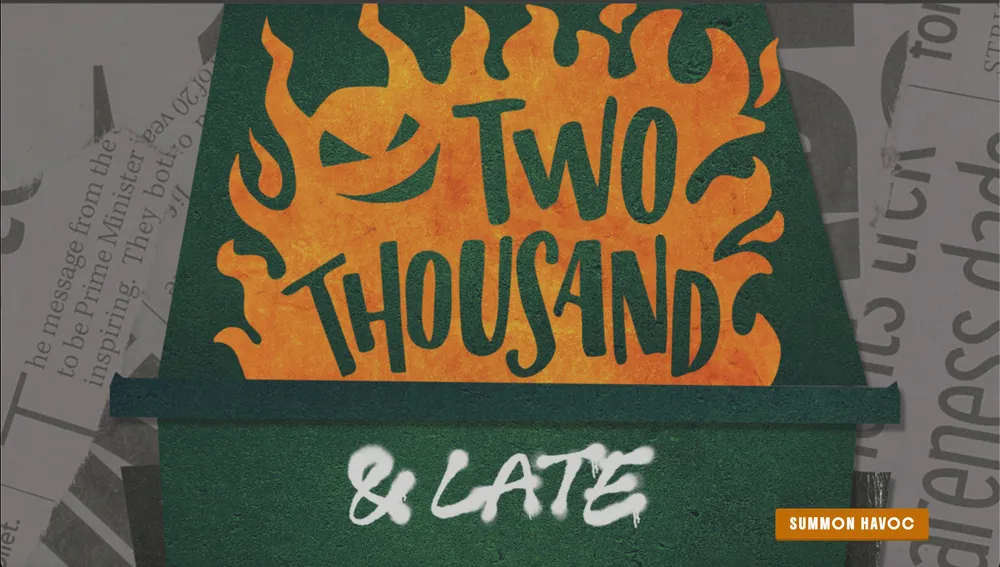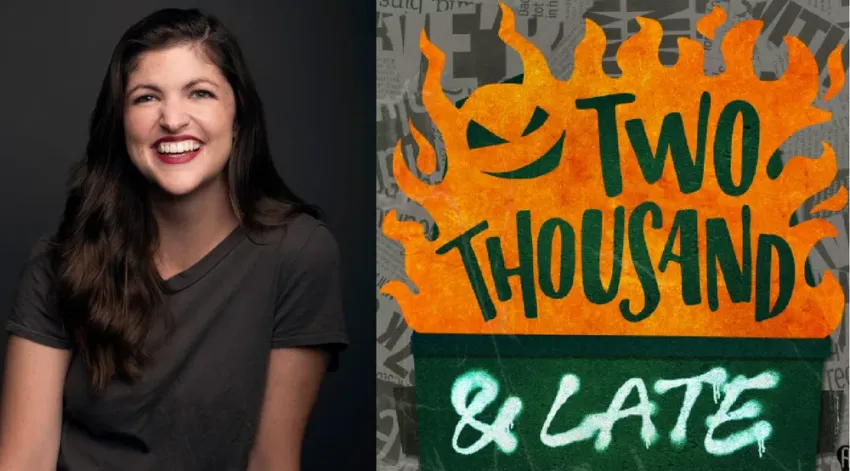What if a demon sent to possess a teenage girl showed up 20 years too late? That’s the premise of writer and director Lauren Shippen’s latest project, Two Thousand and Late, a campy, Queer, horror-adjacent podcast series produced by Atypical Artists. Known for her work with thrilling audio dramas, such as The Bright Sessions, Shippen is bringing her quirky feminist rage to Apple Podcasts, with new episodes dropping each week until Halloween.
Two Thousand and Late follows the misadventures of a burnt-out millennial artist who suddenly finds herself possessed by a demon who has just lost track of time. “It arrives and looks around at 2025 America and is like, ‘Oh, you guys are doing a pretty good job already,’” Shippen said, “and so the two of them end up using their demonic forces combined to, well, in the first episode, deal with a street harasser.”
Inspired by classic teenage girl “chosen one” stories and her own “Queer and feminist rage,” Shippen began building the world of Two Thousand and Late in 2020. As a fan of Tom Hardy in Venom, she wondered what it was about the possession story that specifically required a male protagonist. For fun, she began to brainstorm what the female version might look like, and landed on a 36-year-old woman naturally exhausted by the issues she faces in society.
“What I wanted to explore was the idea of a woman getting to be messy and violent and kind of a loser in the way that Eddie and Venom are losers,” she said. “They’re just total failures. Oftentimes, on screen, we have a strong female lead. We increasingly have wonderfully complex women, but we don’t get to see women on TV and in films or in books who suck. Like, they’re just losers. Harper, the lead character in this, is very much a loser, and that was important to me.”
Naturally, Shippen was faced with the same question that plagues most of society: “But what is so special about a woman in her thirties, anyway?” In other words, why would a demon choose her?
“Well, maybe the demon is also a fuck-up?” Shippen said. With that simple idea, she had her story. “It is very much about the fact that our society is becoming more hostile to anybody different, whether that’s because they are Queer or Trans or nonwhite or an immigrant or what have you.”
Shippen has always enjoyed darker stories, particularly those that feature misfits and societal outcasts. “I’m very drawn to narratives of monstrousness — when a monster is not a monster when you love it,” she said.

As a Queer woman, Shippen finds this affinity for monstrous characters — like Frankenstein — an apt metaphor for society’s treatment of LGBTQIA+ people. “Queer love was — and still is — positioned by a lot of society as something unnatural, as something divergent and degenerate,” Shippen said. Much like monsters, Queer people are feared, relegated to hide in the darkness, and often misunderstood or scapegoated by a corrupt society.
Shippen found that Queer love, much like monster stories, requires a form of radical acceptance, of oneself, one’s lover, and one’s community, despite the perception of society. “Loving that person despite — or even in some cases because of — that monstrousness, [or] loving somebody in a way that society views as monstrous [is] inherently Queer.”
Shippen got her start in writing for audio projects in 2015, though she has also published several novels. While there are many forms a story can take today — from movies to books — she finds something very unique in crafting audio fiction, a medium that is very different from audiobooks.
“Harper is our POV character,” she explained. “We’re with her in every single scene; we never drift away from her perspective. Then Havoc, the demon that’s possessing her, sometimes speaks out loud, but mostly speaks inside of her head. That’s something that works exceptionally well in audio.” Audio programs also rely on the listener’s imagination in ways other media don’t. Whereas a book might describe the physical characteristics of the demons in Two Thousand and Late, the audio fiction only provides sound effects and voices, allowing the listener to imagine what Havoc might look like. “When the demon first possesses Harper, we hear that and we hear this scary voice, but we don’t actually see what’s happening. We can infer what exactly is going on, and to me, that’s a lot more fun,” Shippen added.
New episodes are released every Monday evening on Apple Podcasts. A pioneer of the audio fiction platform, Shippen and Atypical Artists have a wide variety of audio comedy and dramas, and also recommend checking out Seattle-based series Metropolis, Dirt, and Soul Operator.
Support the Seattle Gay News: Celebrate 51 Years with Us!
As the third-oldest LGBTQIA+ newspaper in the United States, the Seattle Gay News (SGN) has been a vital independent source of news and entertainment for Seattle and the Pacific Northwest since 1974.
As we celebrate our 51st year, we need your support to continue our mission.
A monthly contribution will ensure that SGN remains a beacon of truth and a virtual gathering place for community dialogue.
Help us keep printing and providing a platform for LGBTQIA+ voices.
How you can donate!
Using this link: givebutter.com/6lZnDB
Text “SGN” to 53-555
Or Scan the QR code below!



